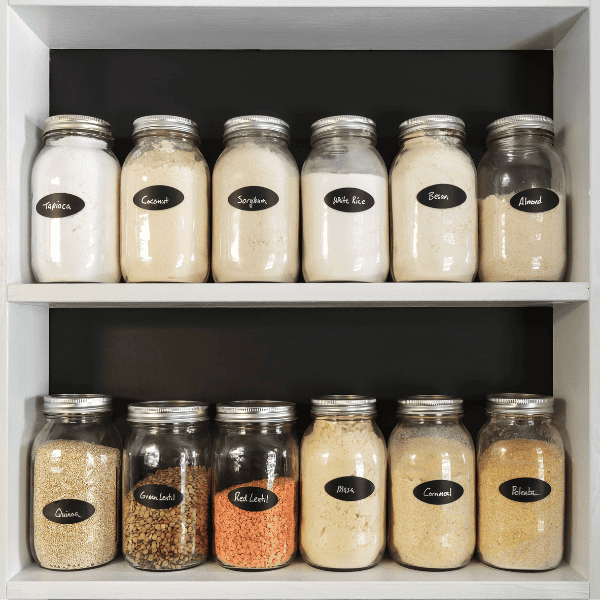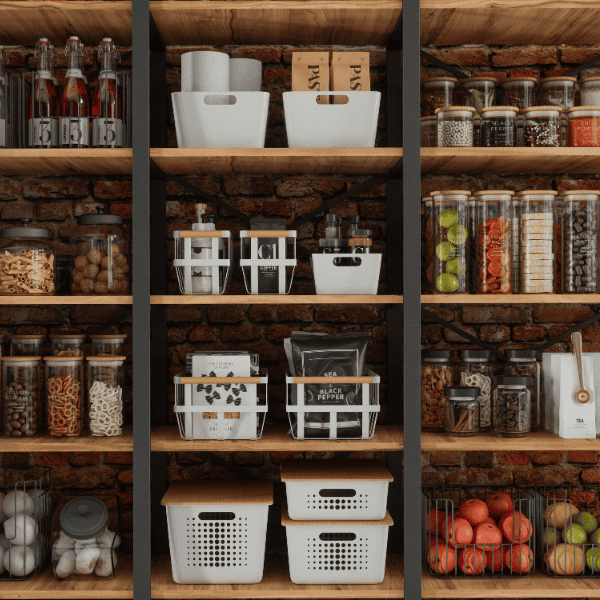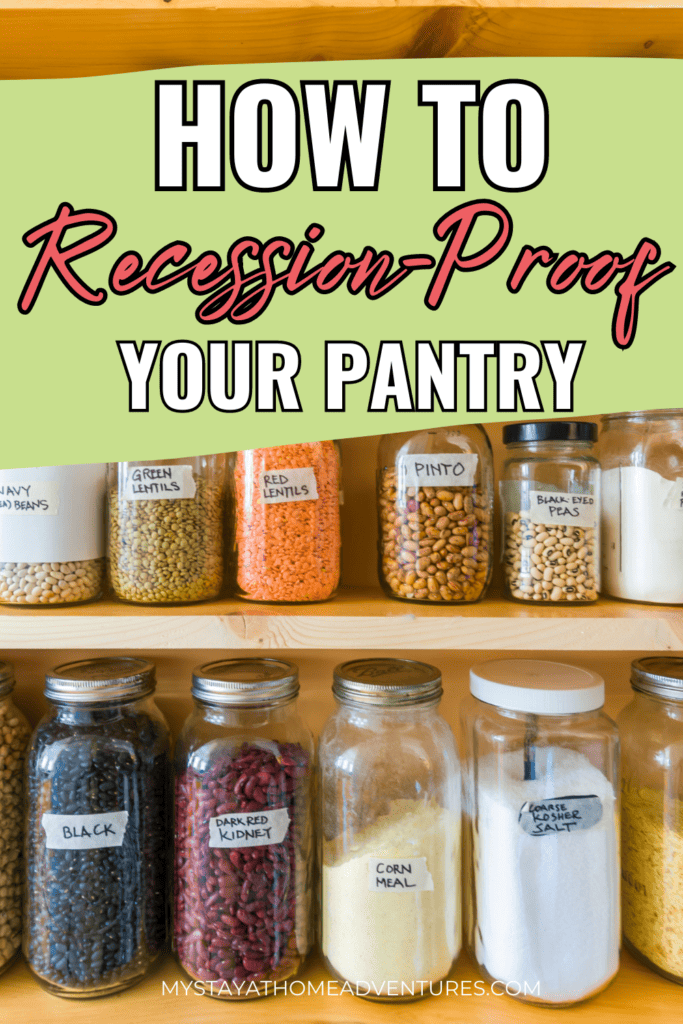How To Recession-Proof Your Pantry
This post may contain affiliate links which might earn us money. Please read my Disclosure and Privacy policies hereLearn how to recession-proof your pantry! Let's begin! In these uncertain times, having a well-stocked pantry that won't break the bank is more important than ever. Certain ingredients should always be on hand whether you want to save money or be prepared for any situation.
From affordable staples like beans and dried pasta to lesser-known items like tinned fish and frozen veggies, there are plenty of ways to recession-proof your pantry without sacrificing flavor or nutrition.
Let's explore some of the best ingredients and tips for building a pantry that can withstand any economic downturn, but first, let's answer some popular questions.

What food to stock for a recession?
The best food to have during a recession is non-perishable, affordable, shelf-stable items. Consider stocking up on canned or dried beans, rice, oats, lentils, nuts and nut butter, frozen vegetables, pasta, and grains. These ingredients all last for months in your pantry and can be used to create budget-friendly meals.
| Pantry Staple Category | Item | Storage Tip |
|---|---|---|
| Dried Ingredients | Lentils, Beans, Dried fruits, Pasta | Store in a cool, dry place in airtight containers to prevent moisture and bugs. |
| Seasonings | Salt, Black pepper, Cumin, Chili powder, Garlic powder, Oregano | Keep in a cool, dark place in sealed containers to maintain flavor and freshness. |
| Grains | Rice, Quinoa, Oats, Barley, Cornmeal | Store in a cool, dry place in airtight containers. Can be stored in the refrigerator for longer shelf life. |
| Frozen Items | Frozen vegetables, Frozen fruits, Frozen meats, Bread | Keep frozen at all times. Try to use within the best-by date for optimal quality. |
| Canned Goods | Soups, Vegetables, Fruits, Beans, Tuna | Store in a cool, dry place. Use by the best-by date for optimal quality. |
These items are generally recession-proof as they have long shelf lives, are versatile in many recipes, and are cost-effective. Always check the expiration dates and store them properly to maximize their lifespan.
How can I make my pantry last longer?
A great way to stretch your food budget is to buy in bulk and portion out smaller amounts for meals. For example, buying a large bag of rice or beans, then breaking it into meal-sized portions. Doing this helps the ingredients last longer and also allows you to save on packaging costs.
You can also store food in airtight containers to prevent spoilage and use up ingredients before they go bad. If you have any leftovers, freeze them for another time or try turning them into a completely different dish!
Should you stock up on food during a recession?
Stocking up on food can help you save money and provide peace of mind during a recession. It can also help you be prepared for unexpected events like natural disasters or job losses that could lead to potential food shortages. However, it is important to remember that stockpiling requires careful consideration and proper storage; otherwise, your pantry staples could spoil before you can use them.
How do I stock my pantry for emergencies?
When stocking your pantry for emergencies, choosing items that will last and can be used in many different dishes is important. Shelf-stable items such as canned and dried beans, rice, oats, grains, pasta, canned vegetables, and fruits, legumes, nuts, and seeds are all great options.
You should also make sure you have a variety of condiments, seasonings, oils, and vinegar to add flavor to your meals. These items will help you make delicious dishes from even the most basic ingredients.
Importance of having a well-stocked pantry
Having a well-stocked pantry can provide peace of mind and help you save money. It can also help you be prepared for unexpected events like job losses, natural disasters, or food shortages. Additionally, having the right ingredients on hand will make it easier to whip up delicious and budget-friendly meals without breaking the bank.
Saving money during tight times
Saving during tight times is essential for many people, especially during economic uncertainty. With these affordable and adaptable pantry ingredients, you can stretch your budget without sacrificing flavor or nutrition:
- Stock up on superstar pantry ingredients like beans, lentils, and dried pasta. They are classic kitchen staples and easily adaptable.
- Choose dried pulses over canned varieties for a more cost-effective and healthy option with high protein and fiber content.
- Buying in bulk, like rice, or frozen produce, can yield greater savings.
- Substitute pricier animal proteins with filling and affordable complete protein combinations like beans and rice.
- Canned tomatoes are a cheap alternative to canned sauce and can add rich flavor to soups, stews, braises, and chilis.
- Freeze unused ingredients like tinned fish, cooked meat, and chopped veggies for easy portioning and less food waste.
- Ground rolled oats can be used as healthy flour, and pasta made with lentils can be a new high-protein option.
- Tofu is a much more affordable protein source than meat and can be used in almost any meal due to its mellow flavor.
- Frozen fruits and veggies, as produce is typically frozen at peak ripeness, will retain all of their vitamins and minerals for a fraction of the cost.

What are some affordable and adaptable pantry ingredients?
Beans, lentils, and dried pasta are classic kitchen staples that can easily be adapted to any meal. Canned tomatoes, tinned fish, and frozen fruits and veggies are great options for adding flavor without breaking the bank. Ground rolled oats can also be used as a healthy flour substitute. Tofu is an affordable protein source and can be used in almost any meal due to its mild flavor.
Below are some tips for affordable and adaptable pantry ingredients to recession-proof your pantry:
- Beans are a superstar ingredient that saves money without sacrificing flavor. They are easily adaptable to various dishes and keep well for months. Dried pulses are a much more cost-effective option than canned varieties, offering high protein and fiber content.
- Rice is another affordable pantry staple that can be bought in bulk, yielding greater savings than buying in small bags. When combined with beans, it produces a complete protein and makes a filling substitute for pricier animal proteins.
- Canned fish, such as tuna and salmon, is an affordable and healthy option that can be used to add a savory flavor to sautéed veggies and spreads.
- Rolled oats are not just for making oatmeal but can also be used for homemade granola or as a healthy flour substitute in baked goods and savory fritters.
- Pasta is a classic and reliable pantry item that can be used to feed the masses. With more variety available than ever before, try a whole-wheat variety, one made with lentils, or a new shape to mix it up.
- Eggs are much more affordable than meat and can be used in almost any meal due to their mellow flavor. They take on the flavors of whatever they're cooked with and have a similar texture to chicken when pressed.
- Frozen fruits and veggies, like spinach, are a cheap alternative to expensive fresh produce. They retain all of their vitamins and minerals when frozen at peak ripeness and come in higher quantities for more bang for your buck.
What Pantry Items To Avoid
Although stocking up on highly processed and packaged foods may be tempting, these items can be costly in the long run. They are often high in sodium and saturated fat, leading to health issues over time. Additionally, they tend to have a much shorter shelf life than more natural pantry staples, making them less economical.
Rather than buying pre-made sauces or meals, opt for sauces you can make yourself from pantry ingredients like canned tomatoes, spices, and herbs. This will save you money and add nutrients back into your diet that may have been lost in processing.
Finally, avoid anything with added sugars or artificial sweeteners, as these will contribute to tooth decay and other health problems over time.
| Pantry Item | Reason |
|---|---|
| Fresh Produce | Fresh fruits and vegetables have a short shelf life and can spoil quickly, leading to waste. |
| Specialty Condiments | These are often more expensive and less versatile than basic condiments and seasonings. |
| Expensive Cuts of Meat | They can be costly and don't necessarily offer more nutrition than cheaper cuts or plant-based proteins. |
| Bottled Water | It's much more cost-effective to filter tap water, and storing large quantities of bottled water takes up valuable space. |
| Pre-made Meals | They can be expensive per serving compared to cooking from scratch and often contain less nutritious ingredients. |
| Snack Foods | Items like chips, cookies, and candies can be pricey and offer little nutritional value. |
| Brand-Name Items | Generic brands often offer the same quality at a lower price. |
| Fresh Baked Goods | These items spoil quickly. Opt for bread or pastries that can be frozen and used as needed instead. |
A recession-proof pantry aims to maximize nutritional value and versatility while minimizing cost and waste. Therefore, avoiding items that don't meet these criteria is best.
By stocking up on affordable and adaptable pantry items, you can be prepared for almost anything while still maintaining your budget. With the right ingredients on hand, you can whip up delicious meals without breaking the bank!
Try it out and see just how much money you can save in the long run. That's why taking some simple steps to recession-proof your pantry is so important — it will help ensure that your finances stay healthy no matter what life throws at you.







